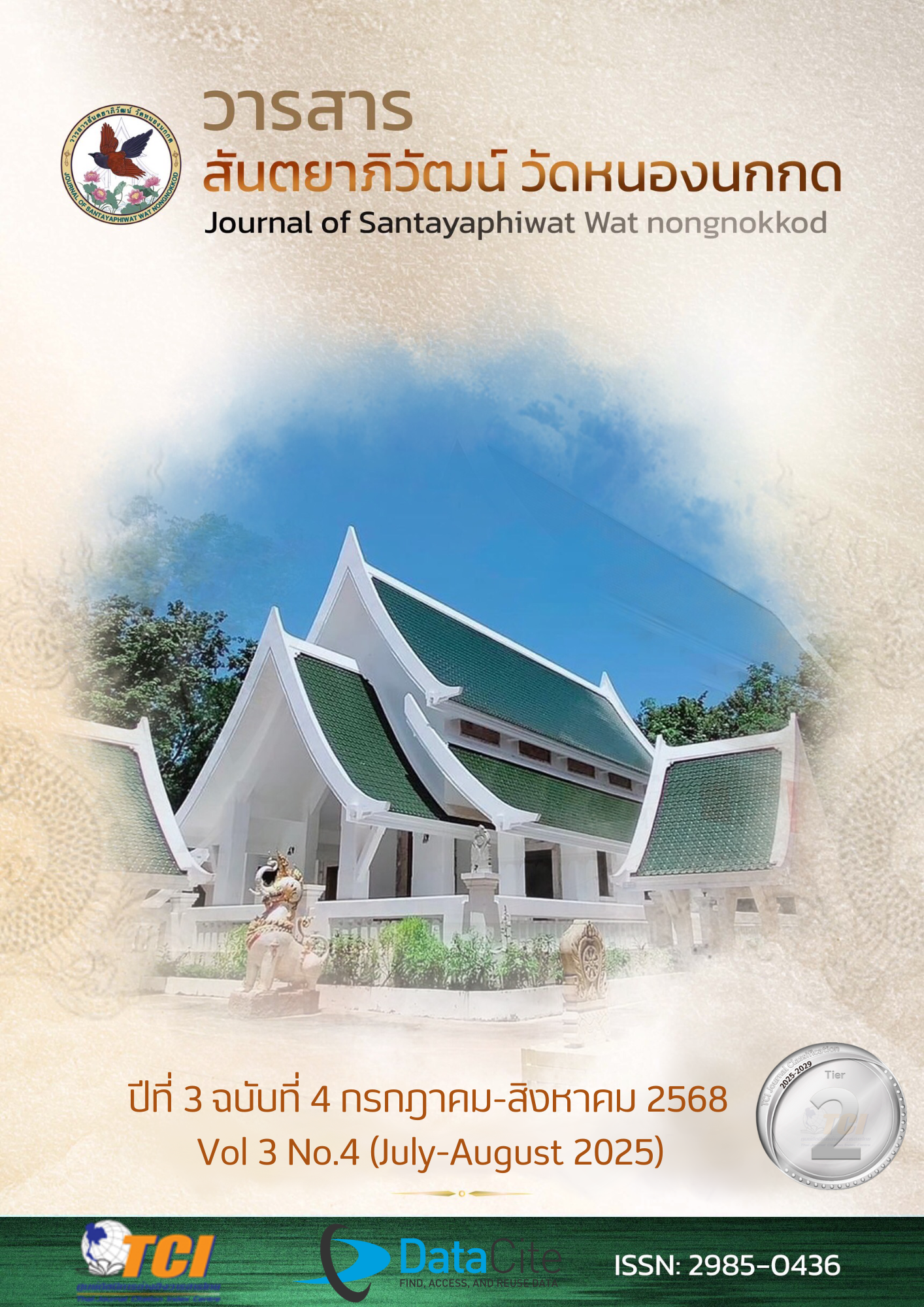LOCAL PARTICIPATORY LEADERSHIP IN THE NEW NORMAL ERA
Keywords:
Participatory Leadership, Local, New Normal EraAbstract
The New Normal era is a new way of life that is different from the past. Due to the COVID-19 pandemic, it is an adjustment to a new way of life to be safe from infection, such as social distancing, paying more attention to health, along with efforts to maintain and restore economic potential, leading to the creation of new technologies and innovations. And as time passes, people in society will become accustomed to new behaviors until it eventually becomes part of normal life.
This article aims to present local participatory leadership in the New Normal era. The results of the study found that participatory leadership is an important factor for organizations that help them achieve their goals. It requires trust and confidence in their own leadership. Participatory leadership is a factor that makes local organizational development successful, especially in promoting collaborative work. Leaders must motivate personnel or related persons to have the opportunity to participate in thinking, decision-making, working, and taking responsibility, as well as evaluating the results so that all parties are aware of their duties and responsibilities together, which will lead to the organization's success goals according to the plan. Therefore, local participatory leadership in the New Normal era must have 5 leadership qualities: 1) Vision, 2) Systemic thinking, 3) Use of technology, 4) Responsibility, and 5) Flexibility. These 5 leadership qualities will enable local organizational management to achieve its goals and be successful in the New Normal era.
References
กิตติยา สุขเกษมและคณะ. (2565). แนวทางการพัฒนาภาวะผู้นำแบบมีส่วนร่วมตามหลักพรหมวิหารธรรมของผู้บริหารสถานศึกษาในกลุ่มโรงเรียนจตุรมิตร อำเภอลาดยาว จังหวัดนครสวรรค์สำนักงานเขตพื้นที่การศึกษาประถมศึกษานครสวรรค์ เขต 2. วารสารวิจยวิชาการ, 5(2), 77-90.
ชญานุช เรืองจันทร์. (2564). ความปกติใหม่ (New Normal). เรียกใช้เมื่อ 22 มีนาคม 2568. จาก https://www.nsm.or.th/nsm/th/node/5730
ดาวรุวรรณ ถวิลการ. (2558). “ภาวะผู้นำเหนือผู้นำ” แบบภาวะผู้นำแห่งศตวรรษที่ 21. วารสารบริหารการศึกษา มหาวิทยาลัยขอนแก่น, 11(2), 23-35.
บุญชนะ เมฆโต. (2560). อิทธิพลของภาวะผู้นำการเปลี่ยนแปลงที่มีผลต่อความผูกพันองค์กรและการตั้งใจลาออกของพนักงานระดับปฎิบัติการ กรณีศึกษา : บริษัทผลิตวัสดุบรรจุภัณฑ์แห่ง. HROD Journal, 9(1), 36-59.
เบธ วิลเลียมส์. (2567). 7 วิธีในการสร้างภาวะผู้นำแบบร่วมมือกัน. เรียกใช้เมื่อ 22 มีนาคม 2568. จาก https://primeast.com/us/insights/7-ways-to-build-collaborative-leadership
ประจักษ์ ผิวงาม. (2554). ภาวะผู้นำการเปลี่ยนแปลงของกำนันผู้ใหญ่บ้านในเขตพื้นที่ อำเภอศรีรัตนะ จังหวัดศรีสะเกษ. คณะรัฐศาสตร์ สาขารัฐประศาสตรศาตร์. บัณฑิตวิทยาลัย : มหาลัยอุบลราชธานี.
พระณัฐวุฒิ พันทะลีและคณะ. (2565). ภาวะผู้นำขององค์กรปกครองส่วนท้องถิ่นในยุคดิจิทัล. วารสารการจัดการและพัฒนาท้องถิ่น มหาวิทยาลัยราชภัฏพิบูลสงคราม, 2(2), 74-86.
พัชราภรณ์ ดวงชื่น. (2563). การบริหารจัดการศึกษารับความปกติใหม่หลังวิกฤตโควิด-19. วารสารศิลปการจัดการ, 4(3), 783-795.
พัชรี เครือรัตน์. (2566). ภาวะผู้นำในยุคปกติถัดไปของผู้บริหารสถานศึกษา สังกัดสำนักงานเขตพื้นที่การศึกษาประถมศึกษาขอนแก่น เขต 1. ปริญญาศึกษาศาสตรมหาบัณฑิต สาขาวิชาการบริหารการศึกษา คณะศึกษาศาสตร์. บัณฑิตวิทยาลัย : มหาวิทยาลัยมหามกุฏราชวิทยาลัย.
วีระนนท์ จากผา. (2566). ภาวะผู้นำและการมีส่วนร่วมของประชาชนที่มีผลต่อประสิทธิผลการปฏิบัติงานตามหน้าที่ของกำนันและผู้ใหญ่บ้านในเขตอำเภอวานรนิวาส จังหวัดสกลนคร. ปริญญารัฐประศาสนศาสตรมหาบัณฑิต สาขาวิชารัฐประศาสนศาสตร์. บัณฑิตวิทยาลัย : มหาวิทยาลัยราชภัฏสกลนคร.
วีระพงศ์ เกียรติไพรยศ และ พระปลัดสถิตย์ โพธิญาโณ. (2565). ภาวะผู้นำกับการบริหารองค์การในยุคนิวนอร์มัล. วารสารพุทธสังคมวิทยาปริทรรศน์, 7(1), 123-134.
สุภาภรณ์ พรหมบุตร. (2563). New Normal กับวิถีชีวิตที่เปลี่ยนแปลง. เรียกใช้เมื่อ 22 มีนาคม 2568. จาก https://www.dip.go.th › dowload-file-news
Gibson, J.L., Ivancevich, J.M., & Donnelly, J.H., (1997). Organization behavior structureprocess (9 th ed). New York: McGraw-Hill.
Halpin, A.W. (2006). Theory and research in administration. New York: Macmillan.
Marshall Goldsmith (2022). The Next Normal: Transform your leadership, your team, and your organization. Lioncrest Publishing.
Owens, R.G. (2001). Organization behavior in education: instructional leadership andschool reform (7 th ed.). Boston: Allyn and Bacon.









